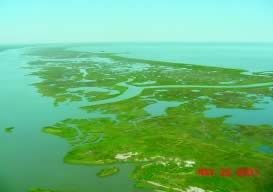Louisiana state official signs agreement needed to close the notorious MR-GO

Facing South has reported on the catastrophic impact of the federally-sponsored Mississippi River-Gulf Outlet (MR-GO), a money-losing shipping lane that ultimately intensified Hurricane Katrina's storm surge.
This week Louisiana's coastal czar moved to break an apparent deadlock with the Army Corps of Engineers, sending a letter to a senior Corps official committing the state to expediting the purchase of land needed to build a rock dike to close the MR-GO, reports the Times-Picayune.
According to the Times-Picayune:
Coastal Protection and Restoration Authority Chairman Garret Graves said he decided to send the tersely worded letter to John Paul Woodley, assistant secretary of the Army for public works, after hearing that local corps officials had blamed the state for delays in signing an agreement with the corps on closing the controversial shipping channel, also known as the MR-GO.
...
In the letter, Graves reiterated the state's position that the law authorizing the closure "establishes that this work on the MR-GO is to be conducted at 'full federal expense' -- or at no cost to the parishes, levee districts or the state of Louisiana."
Earlier this month the Associated Press reported that some fifty years after digging MR-GO and destroying vast wetland areas, the Corps has finally begun to look at restoring the damage the channel caused in the swampy landscape southeast of New Orleans. The Corps announced plans to conduct public hearings starting next month on what measures can and should be taken to restore the coastal wetlands in question.
For years the EPA and other federal agencies let energy companies and other interests decimate Louisiana's coastal wetlands, the best buffers against hurricanes. For just as many years, residents, coastal advocates, environmentalists, civil rights groups, and policy makers argued for MR-GO's closure, as the shipping channel continued to grow in size due to erosion, bringing with it daily tidal flows of salt water that killed marsh and swamp forests. It wasn't until after the devastation of Katrina that that the outcry against the channel gained momentum, prompting Congress to allow the Corps to close the shipping route. The Corps plans to hire contractors to plug the channel by June 2009 with rocks.
Scientists and residents blame the MR-GO for flooding in eastern portions of the metropolitan area, and a lawsuit over that allegation is pending in which the Corps faces paying residents tens of millions of dollars in damages.
